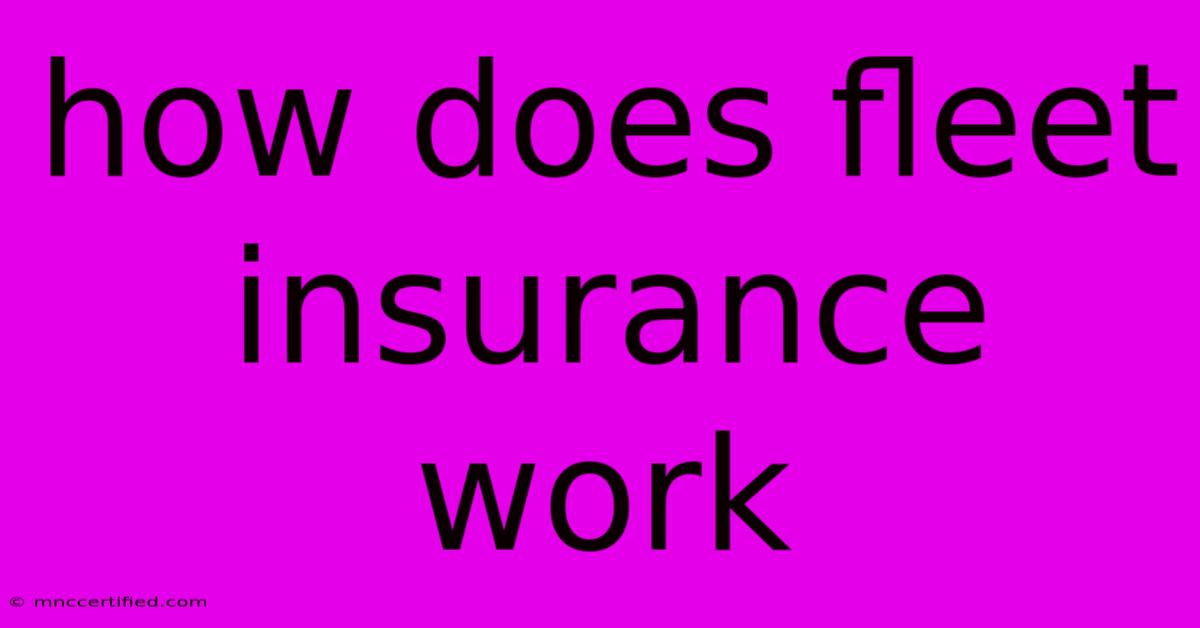How Does Fleet Insurance Work

Table of Contents
How Does Fleet Insurance Work? A Comprehensive Guide
Understanding fleet insurance can feel overwhelming, especially for businesses new to managing multiple vehicles. This comprehensive guide breaks down the complexities, explaining how it works, its benefits, and what to consider when choosing a policy.
What is Fleet Insurance?
Fleet insurance covers multiple vehicles owned or leased by a single business. Unlike insuring individual cars separately, fleet insurance bundles coverage for all vehicles under one policy, offering significant cost and administrative advantages. This is crucial for businesses with 3 or more vehicles, as individual policies become increasingly cumbersome and expensive to manage.
Key Differences from Individual Car Insurance:
- Multiple Vehicles: The primary difference is the coverage of multiple vehicles under a single policy.
- Centralized Management: Policy administration, claims handling, and renewals are centralized, streamlining the process.
- Cost-Effectiveness: Often, fleet insurance offers significant cost savings compared to individual policies, particularly for larger fleets.
- Specialized Coverage: Policies can be tailored to the specific needs of the business, including coverage for specific types of vehicles (e.g., vans, trucks, specialized equipment).
- Driver Monitoring: Some policies include features to monitor driver behavior and improve safety, leading to potential discounts.
How Fleet Insurance Policies Work:
Fleet insurance operates on similar principles to individual car insurance, but with added layers of complexity to manage numerous vehicles and drivers. Here's a breakdown:
1. Assessing Your Fleet Needs:
Before obtaining a quote, accurately assess your fleet's specifics:
- Number of vehicles: The number of vehicles significantly impacts the premium.
- Vehicle types: Different vehicle types (cars, vans, trucks) have varying risk profiles and premiums.
- Driver profiles: Driver experience and history influence the premium. High-risk drivers will increase costs.
- Usage: How are the vehicles used? Commercial use typically commands higher premiums than personal use.
- Geographic location: Risk factors vary by location, affecting premiums.
2. Obtaining Quotes from Insurers:
Contact multiple insurers to compare quotes. Provide detailed information about your fleet to receive accurate estimates. Don't hesitate to negotiate!
3. Policy Selection and Coverage:
Choose a policy that adequately protects your business. Common coverage options include:
- Liability Coverage: Protects against financial losses from accidents you cause.
- Collision Coverage: Covers damage to your vehicles in accidents, regardless of fault.
- Comprehensive Coverage: Covers damage from non-collision events (e.g., theft, vandalism).
- Uninsured/Underinsured Motorist Coverage: Protects you if you're involved in an accident with an uninsured driver.
- Cargo Coverage: Protects goods being transported in your vehicles.
4. Policy Management and Claims:
Once the policy is in place, maintain accurate records of vehicles and drivers. In case of an accident or incident, promptly report it to your insurer to initiate the claims process. Effective communication with your insurer is key for smooth claims handling.
Benefits of Fleet Insurance:
- Cost Savings: Significant savings compared to individual policies, especially for larger fleets.
- Simplified Administration: Centralized management simplifies paperwork and renewal processes.
- Improved Risk Management: Features like driver monitoring can help improve safety and reduce accidents.
- Enhanced Coverage Options: Tailored policies meet specific business needs.
- Negotiating Power: Insurers are often more receptive to negotiations for larger fleets.
Choosing the Right Fleet Insurance Provider:
Selecting the right provider is crucial. Consider these factors:
- Reputation and Financial Stability: Choose a reputable insurer with a strong track record.
- Coverage Options: Ensure the policy covers your specific needs.
- Claims Process: Inquire about the insurer's claims handling process and customer service.
- Pricing and Discounts: Compare quotes and look for discounts based on safety records or driver training programs.
In conclusion, fleet insurance is a vital tool for businesses operating multiple vehicles. By understanding how it works and choosing the right provider, businesses can effectively manage risk, reduce costs, and ensure the smooth operation of their fleet. Remember to thoroughly research and compare options before committing to a policy.

Thank you for visiting our website wich cover about How Does Fleet Insurance Work. We hope the information provided has been useful to you. Feel free to contact us if you have any questions or need further assistance. See you next time and dont miss to bookmark.
Featured Posts
-
Liz Hatton A Royal Muse
Nov 29, 2024
-
73k Raised Jay Slater Donation Page Ends
Nov 29, 2024
-
Is Starbucks Open Thanksgiving Day
Nov 29, 2024
-
Live Tottenham Vs Roma Tv And Team News
Nov 29, 2024
-
Cold Weather Payments Triggered Eligible Postcodes
Nov 29, 2024